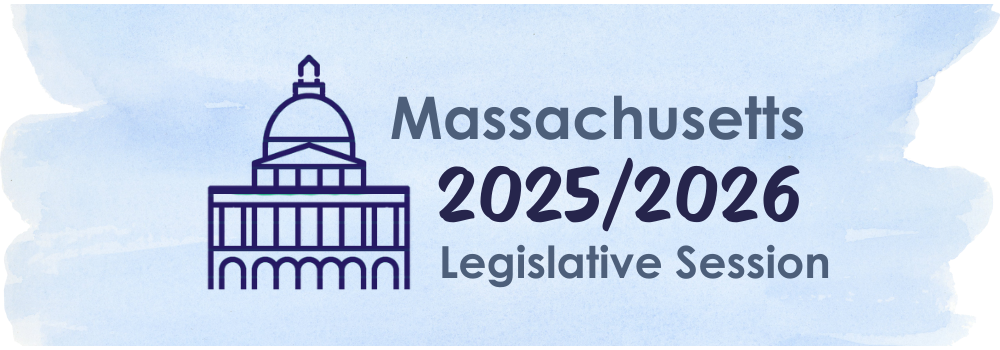
2025/2026 BILLS
Learn about the bills we are supporting and opposing this legislative session and take action.
HEARINGS HAVE BEEN SCHEDULED

DATE: Friday June 6th 2025
TIME: 10am – 5pm
LOCATION: Gardner Auditorium, MA State House, 24 Beacon Street, Boston MA
TESTIMONY DETAILS: Each person has 3 minutes to give verbal testimony for all the bills these support/oppose. We recommend that everyone submit written testimony.
THE DEADLINE TO PRE-REGISTER FOR VERBAL OR IN-PERSON TESTIMONY HAS PASSED. HOWEVER, IF YOU STILL WISH TO TESTIFY, YOU ARE ENCOURAGED TO ATTEND THE HEARING AND SIGN UP ON-SITE FOR SAME-DAY TESTIMONY.
SAME DAY SIGN-UP FOR IN-PERSON TESTIMONY ONLY – IF TIME ALLOWS: Individuals who miss the deadline to pre-register for testimony may appear on the day of the hearing and sign-up to speak in person on forms provided by committee staff outside of the hearing room. Time permitting, when all pre-registered individuals have been called to testify, the Chairs will then call any individuals who sign-up on the day of the hearing.
WRITTEN TESTIMONY: If you would like to provide written testimony, please include the bill number in the subject line of the email, as well as your name, address, phone number, and organization, if any, on the submitted testimony. Written testimony is encouraged and will continue to be accepted after the hearing until the relevant bill is acted upon. Such testimony may be submitted via email to JointCommittee.PublicHealth@malegislature.gov. Please include “Public Health Committee Testimony, [Relevant Bill Number]” in the subject line of the email. Those who plan to submit only written testimony may do so before or after the signup deadline. Once again, those submitting written testimony should be aware that all written testimony submitted will be read by committee members and staff and may be made available for public review on the Legislature’s website.
URGENT ACTION ITEM: Tell Lawmakers: Remove the “Elevated Risk” Pilot from Budget Line Item 4516-1000
Senator Rebecca Rausch has quietly embedded language from her discriminatory and widely opposed Community Immunity Act (S.1618) into the FY2026 State Budget—specifically within Line Item 4516-1000 of Senate Bill No. 2525.
This marks the fifth time she has attempted to push this controversial provision through the budget process—bypassing public hearings, stakeholder input, and legislative debate.
Key Concerns
1. Misleading Framing and Disproportionate School Burden
This amendment imposes a state-created designation, mandates public notification, and enables forced presentations—all without local consent. The burden would fall hardest on underfunded schools with high percentages of:
High-needs students
Students with disabilities
English language learners
Low-income and homeless populations
Religious, special education, and small schools would be disproportionately affected. Publicly labeling a school as “elevated risk” invites stigma and may drive families away, undermining trust and enrollment.
2. Public immunization data is already available at mass.gov/info-details/school-immunizations, where families can view school-level data for the 2024–2025 academic year and past years. Lower immunization rates may reflect access issues, not opposition.
3. No Public Process or Transparency
This policy was inserted into the budget without public hearings, stakeholder input, or expert testimony. Embedding controversial mandates in fiscal legislation circumvents democratic process.
4. Sets Up Framework for Future Student Exclusion
While this amendment does not currently authorize student exclusion, it lays the groundwork for such action. The infrastructure it creates mirrors language used in broader legislative efforts to exclude students with exemptions, even in the absence of outbreaks or emergencies.
5. Threat to Special Education and At-Risk Students
Programs under Chapter 766 serving medically complex or vulnerable students could face serious harm. Designating their institutions as “elevated risk” undermines protections under IDEA and Section 504 and invites unjustified scrutiny.
6. Misallocation of Public Health Resources
DPH resources should be used for meaningful services and outreach, not for developing classifications that label and stigmatize schools without any clear public health trigger.
7. Mental Health and Community Trust
This amendment creates a climate of fear and division. Labeling schools in the absence of health emergencies causes anxiety for students, families, and staff—especially those with valid exemptions. Instead of building trust, it encourages targeting, isolation, and mental health challenges.
Our Position
Health Action MA strongly supports public health measures rooted in equity, education, and community engagement. This amendment does none of those things. It stigmatizes schools, misuses public health authority, and bypasses the legislative process.
We respectfully urge the Committee to:
Remove this language from Line Item 4516-1000 of Senate Bill No. 2525;
Reject the use of policy-by-amendment tactics to insert controversial mandates into the state budget;
Ensure full transparency for all immunization-related policies through proper legislative channels.
Massachusetts families deserve open, honest, and thoughtful policymaking.
Please stand for integrity and protect our schools and children from coercive and harmful labeling policies.
BE INFORMED. BE EMPOWERED. BE HEARD.
On this page, you’ll find everything you need to understand and take action on the bills that matter most during the 2025–2026 legislative session.
We’re breaking it all down for you:
- Which bills we support or oppose
- Bill numbers, summaries, and sponsors
- The current status, committees and key updates
- Direct links to full bill text and trusted, fact-based resources
- And most importantly—how you can take action!
Your voice matters. Let’s make sure it’s heard.
BILLS WE SUPPORT


AN ACT RELATIVE TO FAIR EDUCATIONAL PRACTICES
COMMITTEE:
Joint Committee on Education
BILL STATUS:
Hearing took place on July 8th. Committee has til September 6th to report on the bills. They may request one more 30 day extension (October 6th).
BILL SYNOPSIS:
An Act Relative to Fair Educational Practices closes a critical and long-overlooked gap in Massachusetts civil rights law by extending anti-discrimination protections to students enrolled in colleges and universities.
Currently, Section 2 of Chapter 151C of the General Laws prohibits discrimination by higher education institutions only during the admissions process, and only on the basis of:
Race
Religion
Creed
Color
Sex
National origin
Once a student is admitted, Massachusetts law provides no state-level civil rights protection against discrimination during their academic experience—including no protection for students with disabilities. Students must instead rely solely on federal laws like the Americans with Disabilities Act (ADA), which lack consistent enforcement at the state level and do not offer Massachusetts-specific remedies.
This bill corrects that by extending those same civil rights protections to students throughout their enrollment and explicitly including a new protected category: “special medical status.” This term covers:
Disabilities, as defined under the ADA
A student’s condition based on receiving—or declining—preventive, curative, or palliative medical treatments
By establishing enforceable state protections, this bill ensures that students with disabilities and those navigating medical decisions are not left vulnerable to inconsistent or discretionary treatment.
It guarantees that all students—regardless of health status or medical choices—can pursue their education free from discrimination, with dignity and equal protection under Massachusetts law.

AN ACT PROHIBITING HARMFUL FOOD DYES IN COMPETITIVE SCHOOL FOODS
COMMITTEE:
Joint Committee on Public Health
BILL STATUS:
Awaiting Hearing Date
BILL SYNOPSIS: An Act Prohibiting Harmful Food Dyes in Competitive School Foods seeks to prohibit the sale or provision of competitive foods and non-sweetened carbonated water containing certain artificial food dyes (Blue 1, Blue 2, Green 3, Red 3, Red 40, Yellow 5, and Yellow 6) in public schools.
Exceptions allow the sale of these items off school premises, 30 minutes after the school day ends, or during school-related events like booster sales and concession stands.
This bill is a crucial step toward ensuring that all children in Massachusetts have access to safe, nutritious meals in school that support their health and academic success, while still allowing flexibility for extracurricular activities and fundraising efforts.

AN ACT RELATIVE TO THE PROTECTION OF MEDICAL EXEMPTIONS FOR IMMUNIZATIONS FOR SCHOOL ATTENDANCE
COMMITTEES:
S.347 – Joint Committee on Public Health
H.2541 – Joint Committee on Public Health
BILL STATUS:
Hearing took place on June 6th. Committee has til August 4th to report on the bills. They may request one more 30 day extension (Sept 5th).
Include in your email:
- Bill number in the subject line (e.g., “Testimony Supporting S.347 & H.2541”)
- Your full name
- Town
- Phone number
- Organization (if applicable)
CURRENT BILL#:
BILL SYNOPSIS: An Act Relative to the Protection of Medical Exemptions for Immunizations for School Attendance aims to broaden and clarify the criteria physicians can use when considering medical exemptions for school attendance, allowing them to assess a child’s total health circumstances. This bill would also protect physicians from any professional repercussions for issuing medical exemptions. Additionally, it would preserve existing law regarding religious exemptions to immunization for school attendance.
An Act Relative to the Protection of Medical Exemptions for Immunizations for School Attendance is critical for protecting medical decision-making, physician integrity, and parental rights. It ensures fairness in exemption policies for school-aged children in Massachusetts.
BILLS WE OPPOSE


AN ACT RELATIVE TO ROUTINE CHILDHOOD IMMUNIZATIONS & AN ACT RELATIVE TO VACCINES AND PREVENTING FUTURE DISEASE OUTBREAKS
COMMITTEE:
Joint Committee on Public Health
BILL STATUS:
Hearing took place on June 6th. Committee has til August 4th to report on the bills. They may request one more 30 day extension (Sept 5th).
Include in your email:
BILL SYNOPSIS:
Eliminates Religious Exemption for K–12 Students: The proposed legislation would prohibit children from attending any public, private, or charter school if their families object to vaccines based on sincerely held religious beliefs—an unprecedented infringement on First Amendment protections in Massachusetts.
Mirrors California’s Controversial Model: The bill follows the trajectory of California’s restrictive vaccination laws, which began with eliminating non-medical exemptions and progressed toward tight scrutiny and revocation of medical exemptions.
Creates a De Facto Enrollment Ban: Without a religious exemption, families who decline vaccination on religious grounds would be forced to homeschool—regardless of the child’s educational needs, IEP status, or ability to thrive outside a traditional setting.
Triggers Public Reporting by School & Municipality: Mandates schools to report and publish detailed student immunization and medical exemption data—heightening public pressure, community backlash, and reputational harm.
Lays Groundwork for Future Medical Exemption Challenges: By centralizing and publicizing medical exemption data, the bill paves the way for state surveillance and rejection of legitimate medical exemptions, as seen in post-SB276 enforcement trends in California.
Disproportionate Impact on At-Risk Children: Students with disabilities, complex medical conditions, or recent trauma—who may qualify for valid exemptions—could face increased scrutiny, exclusion risk, or forced compliance through state oversight.

AN ACT PROMOTING COMMUNITY IMMUNITY
COMMITTEE:
Joint Committee on Public Health
BILL STATUS:
Hearing took place on June 6th. Committee has til August 4th to report on the bills. They may request one more 30 day extension (Sept 5th).
Include in your email:
- Bill number in the subject line (e.g., “Testimony Opposing S.1618”)
- Your full name
- Town
- Phone number
- Organization (if applicable)
CURRENT BILL #: S.1618
BILL SYNOPSIS: The Community Immunity Act purports to improve and standardize immunization reporting but goes well beyond this reasonable goal. It is complicated, wasteful, and blatantly coercive, not only for students but also for schools and physicians.
The bill applies to public and private K–12 schools, childcare centers and preschools, summer camps and recreational programs, after-school programs, and colleges and universities.
Spanning nine pages, key concerns of the bill include, but are not limited to, the following:
- Minors could consent to preventative care, including vaccination, without parental consent or knowledge — regardless of age or mental capacity.
- Private daycares, schools, and colleges could refuse religious exemptions and impose additional vaccines not required by DPH (such as COVID-19 and HPV).
- Both religious and medical exemptions would require annual submission on a DPH-prepared form, subject to state approval.
- DPH would be free to require vaccines inconsistent with CDC guidelines.
- The bill would allow DPH to bypass CDC recommendations and unilaterally create new immunization requirements without legislative approval.
- Doctors would be required to sign religious and medical exemption forms, which may lead them to dismiss the patient.
- The bill requires separate, annual DPH review and approval for every medical and religious exemption for each school, daycare, camp, or after-school program — creating mountains of duplicative paperwork, needless layers of review, and delays.
- There is no appeal process for denied exemptions, leaving families with no recourse if they believe an exemption was wrongfully denied.
- Children could be excluded from school unjustifiably while waiting for a response from a DPH employee.
- Medical exemptions for medically fragile children could become much more difficult to obtain, as the Act would restrict the criteria physicians can use to issue a medical exemption.
- Schools and programs with immunization rates below a state-defined threshold could be labeled as “Elevated Risk”, triggering public notification requirements and allowing DPH to exclude healthy, unimmunized children — even in the absence of an outbreak or emergency.
- The “Elevated Risk” designation raises serious concerns about privacy, equity, and discrimination, particularly for small schools and minority communities that may be unfairly targeted or stigmatized.

AN ACT ENHANCING ACCESS TO ABORTION CARE
COMMITTEE:
Joint Committee on the Judiciary
BILL STATUS:
Awaiting Hearing Date
BILL SYNOPSIS: An Act Enhancing Access to Abortion goes beyond abortion-related care by granting minors the ability to consent to all forms of preventative care, including vaccinations and sterilization, without parental consent or knowledge. It does not include any age delineations or mental capacity guidelines for minors making these decisions.
This bill strips parents of their fundamental right to be involved in critical healthcare decisions affecting their children, potentially exposing minors to medical interventions without adequate oversight or guidance.

